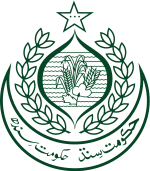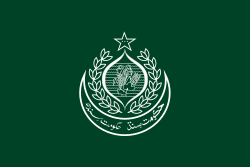The Government of Sindh (Sindhi: حڪومت سنڌ) (Urdu: حکومتِ سندھ) is the provincial government of the province of Sindh, Pakistan. Its powers and structure are set out in the provisions of the 1973 Constitution, in which 30 Districts of 7 Divisions under its authority and jurisdiction.
 Provincial Government Seal | |
 Provincial Government Flag | |
| Seat of government | Karachi |
|---|---|
| Legislature | |
| Assembly | |
| Speaker | Awais Qadir Shah |
| Members | 168 [1] |
| Executive | |
| Governor | Kamran Tessori[2] |
| Chief Secretary | Dr. Muhammad Fakhre Alam [3] |
| Chief Minister | Murad Ali Shah [4] |
| Judiciary | |
| High Court | Sindh High Court |
| Chief justice of High Court | Aqeel Ahmed Abbasi |
| Website | www |
The province's executive head and head of the government is the Chief Secretary Sindh. All officers and cabinet members report to the Chief Secretary. The Chief Secretary is an appointed official by the Prime Minister of Pakistan. The Chief Secretary of Sindh is usually a Grade 22 officer, belonging to the Pakistan Administrative Service.
Although the Governor is the head of the province on paper, it is largely a ceremonial position; and the main powers lie with the Chief Minister of Sindh and Chief Secretary of Sindh.
The province is governed by a unicameral legislature with the head of government known as the Chief Minister. The Chief Minister, invariably a leader of a political party represented in the Assembly, selects members of the provincial Cabinet.
The terms Government of Sindh or Sindh Government are often used in official documents. The seat of Government is in Karachi, thus serving as the capital of the province.
Executive
The Chief Secretary Sindh, as head of the provincial bureaucracy, is the boss of the province. The provincial Chief Secretary of Grade-22 is equivalent in rank to a Federal Secretary, is appointed by the Prime Minister of Pakistan. Under him comes the entire Government of Sindh.
Currently, there are only 5 Grade-21 Officers in the province.
| No. | Name of Officer | Posting | Service |
|---|---|---|---|
| 1. | Mr. Muhammad Iqbal Memon | Commissioner Karachi Division | Pakistan Administrative Service (PAS) |
| 2. | Baqaullah Unar | ACS/Senior Member Board of Revenue Sindh | Provincial Civil Service (ex-PCS) |
| 3. | Mr. Muhammad Nawaz Shaikh | Chairman Enquiries & Anti-Corruption Establishment | Provincial Civil Service (ex-PCS) |
| 4. | Makhdoom Shakeel-uz-Zaman | Chairman Chief Minister’s Inspection, Enquiries & Implementation Team | Provincial Civil Service (ex-PCS) |
| 5. | Abdul Rasheed Solangi | Secretary Information Department | Provincial Civil Service (ex-PCS) |
| 6. | Abdul Rahim Soomro | Secretary Culture, Tourism, Antiquities & Archives Department | Provincial Civil Service (ex-PCS) |
| 7. | Syed Imtiaz Ali Shah | Member, Sindh Board of Revenue | Provincial Civil Service (ex-PCS) |
| 8. | Saeed Ahmed Awan | Secretary Public Health Engineering & Rural Development department | Provincial Civil Service (ex-PCS) |
Governance
At the Ministerial level, each department is headed by a Provincial Secretary. The Secretary is in-charge of all workings of their department, and in most cases are the Principal Accounting Officers of their department. Provincial Secretaries are usually Grade-20 Officers. There may also be Grade-21 Secretaries, in cases where the post has not been upgraded by the Chief Minister to that of an Additional Chief Secretary.
Apart from the Ministerial level, the Government of Sindh exercises its powers and function through Divisions and Districts. The Commissioners are in-charge of Divisions while Deputy Commissioners are in-charge of Districts. Commissioners report directly to the Chief Secretary are responsibly for everything in their Divisions. There are 6 Divisions, namely; Karachi, Hyderabad, Sukkur, Larkana, Mirpurkhas, and Shaheed Benazirbad. Commissioners are usually Officers of the rank of Grade-20 while the Commissioner Karachi Division is of the Grade-21 rank, as Karachi Division is the most important Division in all of Pakistan.
Top-Personnel
| Top Executive Offices | Name's of Officials | Service/Party | Rank |
|---|---|---|---|
| Chief Minister | Murad Ali Shah | Pakistan Peoples Party | 22 |
| Chief Secretary | Fakhre Alam Irfan | PAS | BS-22 |
| Chairman Enquiries & Anti-Corruption Establishment | Usman Ghani Siddiqui | PSS | BS-21 |
| Chairman Planning and Development Board | Shakeel Ahmed Magnejo | PAS | BS-20 |
| Minister of Universities and Board | Muhammad Ali Khan Malkani | Pakistan Peoples Party | |
| Commissioner Karachi Division | Muhammad Saleem Rajput | PAS | BS-21 |
| Secretary Finance Department | Kazim Hussain Jatoi | PSS | BS-20 |
Departments
Ministry Level
Ministry level departments are usually headed by a Secretary who reports to the Chief Secretary and Chief Minister. The number of ministers in the cabinet is fixed, so a single minister can have multiple portfolios.[6]
- Planning & Development Board
- Planning & Development Department
- Services, General Administration, Coordination Department
- Services Wing
- General Administration Wing
- Inter Provincial Coordination Wing
- I&C Wing
- Training Management & Research Management Wing
- Board of Revenue
- Enquiries & Anti-Corruption Establishment
- Local Government, Housing & Town Planning Department
- Home Department
- Chief Minister's Inspection, Enquiries & Implementation Team
- Universities and Boards Department
- Food Department
- Finance Department
- Health Department
- Culture, Tourism, Antiquities & Archives Department
- Livestock & Fisheries Department
- Auqaf, Religious Affairs, Zakat & Ushr Department
- Works & Services Department
- Information Department
- Excise, Taxation & Narcotics Control
- Population Welfare Department
- Labour & Human Resources Department
- Law & Parliamentary Affairs Department
- Irrigation Department
- Agriculture, Supply & Prices Department
- Forest Department
- Sindh Wildlife Department
- Information, Science & Technology Department
- Cooperative Department
- Women Development Department
- Transport & Mass Transit Department
- Industries & Commerce Department
- Human Settlement Department
- Social Welfare Department
- Mines & Minerals Development Department
- Rehabilitation Department
- Energy Department
- Sports & Youth Affairs Department
- Public Health Engineering & Rural Development Department
- College Education Department
- School Education & Literacy Department
- Environment, Climate Change & Coastal Development Department
- Investment Department
- Minorities Affairs Department
- Human Rights Department
See also
References
External links
- Government of Sindh official website Archived 2013-05-31 at the Wayback Machine